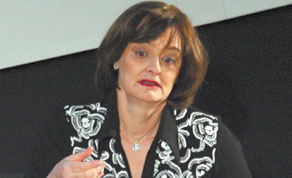 |
| Cherie Blair at the conference yesterday |
Speaking on the sidelines of the fifth Shafallah International Forum, Blair, a human rights lawyer and founder of the Cherie Blair Foundation for Women, said that “conferences like this are vital. I think it’s amazing that it’s in a facility like this because it shows that when you treat disabled people with dignity, how much can be achieved. So it’s a beacon itself for the facilities here, but it’s also a beacon because we’ve had five different conferences over a six year period bringing people around the world together to discuss what we need to do better. “One of the issues is the question of visibility or invisibility, and the social stigma that is attached to the people themselves and often to the wider family,” said Blair.
“I think Qatar, by building this centre which is becoming more and more part of the city of Doha, its become absorbed into the city. The people who work here and learn here are actually going out into the workforce because there is a 3% quota in employment practices here. They are leading the way in showing the Gulf area that there is much to celebrate in the people with disabilities and shame should not be the cultural reaction.”
Blair continued: “The one big step forward here is the One Billion Strong campaign which came out of the conference two years ago, and a real effort here by the Qataris in particular to put their money where their mouth is and actually start investing and helping countries and international organisations really make the policies which are now embodied in the Convention (on the Rights of Persons with Disabilities). That’s not going to happen overnight but its going to happen because people with commitment make it happen.”
Blair highlighted the importance of the Shafallah forum, saying that one of the key issues in promoting the rights of disabled people is “categorising disabled people as somehow people who are a problem, rather than seeing them as net-givers to the world who are part of the solution. That’s a cultural change, which is why we need conferences like this, not only to spread best practice but actually sustain those around the world working, sometimes in very difficult conditions, and give them the ability to recharge their batteries and go back knowing that what they’re doing is supported.”

